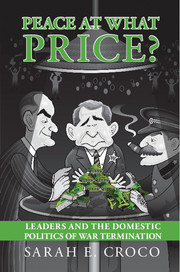Book contents
- Half title page
- Title page
- Copyright page
- Dedication
- Dedication
- Contents
- Contents
- Contents
- Book part
- 1 Introduction
- 2 A Theory of Leader Culpability
- 3 Culpability and Domestic Punishment
- 4 Culpability and Leader Behavior
- 5 Culpability in the Legislature
- 6 Conclusion
- Appendix to Chapter 3
- Appendix to Chapter 4
- Appendix to Chapter 5
- Bibliography
- Index
- References
Bibliography
Published online by Cambridge University Press: 05 March 2015
- Half title page
- Title page
- Copyright page
- Dedication
- Dedication
- Contents
- Contents
- Contents
- Book part
- 1 Introduction
- 2 A Theory of Leader Culpability
- 3 Culpability and Domestic Punishment
- 4 Culpability and Leader Behavior
- 5 Culpability in the Legislature
- 6 Conclusion
- Appendix to Chapter 3
- Appendix to Chapter 4
- Appendix to Chapter 5
- Bibliography
- Index
- References
- Type
- Chapter
- Information
- Peace at What Price?Leader Culpability and the Domestic Politics of War Termination, pp. 219 - 230Publisher: Cambridge University PressPrint publication year: 2015

